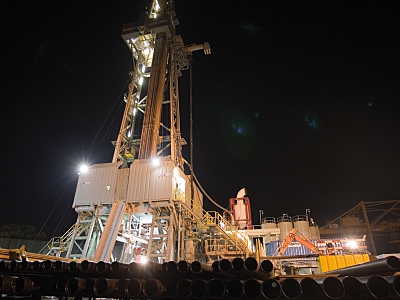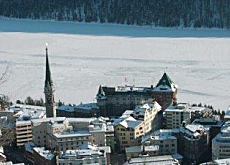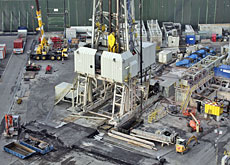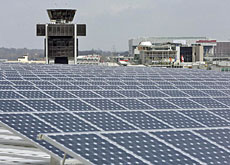Geothermal power is earth-shattering

A series of small earthquakes set off by a large-scale geothermal project has put on hold Switzerland's hopes of tapping into the natural heat of the earth.
The Deep Heat Mining project in Basel was ambitious: geothermal energy produced by it was to have provided heat for nearly 3,000 homes and electricity for 10,000 others starting in 2009.
While small heat pumps that transfer the constant warm temperatures not far below the earth’s surface are becoming more common in Swiss households and offices, the Basel project was a large-scale, experimental Enhanced Geothermal System (EGS).
Holes were drilled five kilometres beneath the surface of the city where the temperature is about 200 degrees Celsius.
The process involves injecting water through artificial fractures in the rock in order to capture the extreme heat before it is forced out of a second borehole. Back at the surface, the hot water runs a steam turbine that is coupled with a generator.
According to international organisations and leading institutions such as the World Energy Council (WEC) and the Massachusetts Institute of Technology, EGSs have the potential to take care of all the world’s energy needs for millennia.
In the short term, the International Energy Agency predicts that geothermal power could cover up to five per cent of the world’s electricity demand by 2020.
But there are problems to overcome before even this modest goal is reached. The WEC says the EGS technology must continue to develop and become more economically feasible.
At fault
And then there is the unpleasant side effect that the creation of artificial fractures deep below the surface can set off earthquakes. The fact that the Deep Heat Mining project took place in Basel, a city that sits squarely in the centre of a fault in the Earth’s crust, left many people shaking their heads.
Their worst fears were confirmed when initial drilling in December last year triggered a minor tremor. Work at the site was immediately stopped but six more minor quakes of at least 2.5 on the Richter Scale were to come over the next few months, all attributed to the geothermal project.
The Swiss Seismological Service complained that the organisation had not been consulted over the initial authorisation process.
“The seismological service would have asked for clarification on additional points if we had been mandated from the start,” said the service’s Nicolas Deichmann at the time.
Property damage
The public prosecutor’s office was overwhelmed with around 200 official complaints, mostly about the threat the project posed to the population and property damage. The office said the company behind the project, Geopower, could be charged with negligence.
Neither did the local authorities escape criticism. The head of the public works department, Barbara Schneider, admitted the people of Basel had been badly prepared for any tremors.
Despite the problems, the authorities are refusing to bury the plans. They have begun a risk assessment based on new data to help decide whether to resume the project at some point.
“The Basel people need to know before the end of the year what the risks would be if work were to restart,” Schneider said. The risk analysis alone will probably take one or two years, so resumption of drilling is years away at best.
Despite the setback, the authorities remain firm supporters of the project and its technology.
“It would be premature to abandon the project given the opportunities associated with the technology. But it would be equally premature to restart work at the plant,” they wrote.
swissinfo with agencies
Total energy consumption in Switzerland was 890,440 terajoules (TJ) or 247,344 gigawatt hours (GWh) in 2005.
Geothermal installations accounted for slightly more than 11 GWh in the same period, according to the Swiss Society for Geothermal Energy.
In comparison, hydropower plants (about 57% of domestic electricity supply) produce around 35,300 GWh annually.

In compliance with the JTI standards
More: SWI swissinfo.ch certified by the Journalism Trust Initiative



You can find an overview of ongoing debates with our journalists here . Please join us!
If you want to start a conversation about a topic raised in this article or want to report factual errors, email us at english@swissinfo.ch.